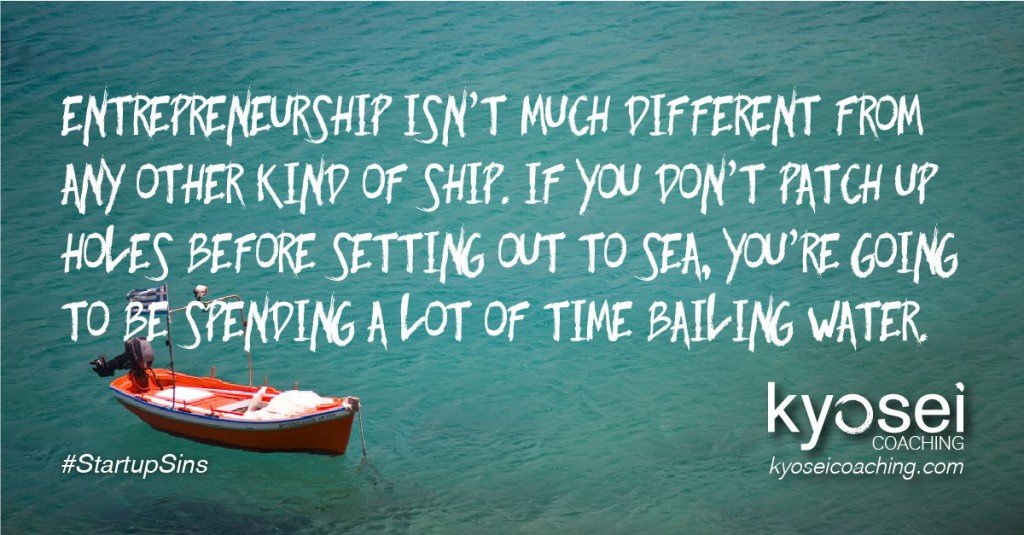Are You an Impatient Entrepreneur?
New entrepreneurs are usually excited and impatient to get going, so they often slap up a website, print business cards and begin promoting their business before they have a solid understanding of their business concept and offering. While there is value in just getting started and having something out there to begin interacting with your customers and finding out what they want, this approach has big risks. It can easily result in investing tons of time and energy promoting something you can’t fully deliver on, sustain at high volume, or do profitably in the long run.
Let’s get real: if you haven’t done market research, written a business plan, or received any professional review and advice on your business concept, your startup’s business concept and revenue model probably has a few holes in it.
But can’t you just figure this out as you go?
Won’t your passion carry you through figuring out all of the details?
Usually not.
Entrepreneurship isn’t much different from any other kind of ship. If you don’t patch up your holes before setting out to sea, you’re going to be spending a lot of time bailing water. If the holes are big enough, you might just sink. Major holes in a revenue model can make the business unsustainable, and, though some of these can be corrected along the way through trial and error, this can result in a tremendous waste of time, energy and money. With ships and businesses both, it’s going to be hard to get where you want to go if you’re too busy bailing out saltwater and patching leaks to steer your craft.
Here’s an example: A potential client came to us with what she thought was a unique idea for creating self-contained craft kits for kids. While the idea had merit, we were pretty sure that someone else was doing it and encouraged the woman to go online to research her competitors and learn from them. She insisted that she had spent a lot of time researching already and that there was nothing like her business idea out there.
After we finished meeting with her, we went back to the office and did a quick Google search. Within less than 5 minutes we came up with more than a dozen competitors that were very similar to her idea. We decided not to take her on as a client. Why? Contrary to popular belief, competition is not a bad thing. In fact the number of similar businesses we found online told us that there was a market for this idea. The quality of businesses our very brief search showed us was also quite low. Most of the sites looked pretty “mom and pop” and none had robust e-commerce systems built in. There was definitely a huge window of opportunity to grow a solid business. The reason we chose not to take her on as a client was that, despite what she said (and no doubt believed), she obviously had not taken the time to do even the most basic level of research on her business idea.

How can impatience kill your business? Impatience leads newbie entrepreneurs to skimp on the planning and preparation needed to build a successful business. This includes lack of time spent:
- Researching the market and your competitors (Hint: Two hours of Googling probably isn’t enough, though it is better than NO hours of Googling);
- Clearly identifying primary and secondary target markets (Hint: “Everyone” is neither an acceptable nor a useful target market);
- Budgeting for expenses (Yes, you really do need to have a marketing budget allocated. However, it needn’t be huge if you’ve targeted well.)
- Projecting sales and cashflow (Where exactly is that first million going to come from? Are you being realistic?);
- Looking into regulations, licenses, permits and other legal issues that are relevant to your product, service or industry. (Discovering barriers to entry in the early stages of your business may make or break your business model. Better to find out early when you can still revise your model, than to discover these once you have already started. At worst, it could put you in a precarious legal position, at best you will have wasted valuable time, money, and energy on a direction that won’t work.)
The most deadly form of impatience sees entrepreneurs forgoing market research in favour of improving their product. A 2014 analysis of 101 “Why my startup failed” essays (bedtime reading for VCs) bears this out. 42% of failed startups didn’t account for a lack of market need for their product.
Why?
This may be a symptom of the very thing that makes entrepreneurs great entrepreneurs: they’re dreamers with an intense and rare passion for what they do. The very energy that drives you to business success can come with blinders. It’s all too easy to forget that your brainchild, as great of an idea as it may be, can’t make a great business unless there’s a market for it. Benjamin Franklin expressed the essence of this sin best in this quote: “By failing to plan, you are planning to fail.”
Being an impatient entrepreneur is a major risk, but over-correcting for it can mean becoming a perfectionist entrepreneur, the type of entrepreneur that spends so much time planning that they never get anything off the ground.

To read more about the dangers of being a perfectionist entrepreneur and the other sins that can sink your business, check out our ebook The Seven Sins of a Startup, available for download here.

